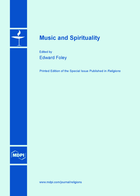Music and Spirituality
A special issue of Religions (ISSN 2077-1444).
Deadline for manuscript submissions: closed (15 November 2014) | Viewed by 83785
Special Issue Editor
Interests: liturgy; practical theology; preaching; social justice; young scholars
Special Issues, Collections and Topics in MDPI journals
Special Issue Information
Dear Colleagues,
Across time and geography people have known the power of music for evoking the gods and acquiring spiritual insight. Whether arising as a textless chant by a single voice or a percussive auditory context for ritual dance, music in its various modes is a virtually ubiquitous companion to religious and spiritual practices. The apparently intangible, insubstantial nature of sound is one of the reasons why music has so effectively symbolized the mysterious and wholly other since the dawn of creation. Not only an accompaniment to one’s spiritual trek, musical compositions from the great oratorios of Handel to the soundtrack to the movie Lord of the Rings also serve as powerful metaphors and inspirations for that journey.
Prof. Dr. Edward Foley
Guest Editor
Manuscript Submission Information
Manuscripts should be submitted online at www.mdpi.com by registering and logging in to this website. Once you are registered, click here to go to the submission form. Manuscripts can be submitted until the deadline. All papers will be peer-reviewed. Accepted papers will be published continuously in the journal (as soon as accepted) and will be listed together on the special issue website. Research articles, review articles as well as short communications are invited. For planned papers, a title and short abstract (about 100 words) can be sent to the Editorial Office for announcement on this website.
Submitted manuscripts should not have been published previously, nor be under consideration for publication elsewhere (except conference proceedings papers). All manuscripts are thoroughly refereed through a double-blind peer-review process. A guide for authors and other relevant information for submission of manuscripts is available on the Instructions for Authors page. Religions is an international peer-reviewed open access monthly journal published by MDPI.
Please visit the Instructions for Authors page before submitting a manuscript. Submitted papers should be well formatted and use good English. Authors may use MDPI's English editing service prior to publication or during author revisions.
Keywords
- spirituality
- music
- acoustics
- sound
- rhythm
- movement
- chant






